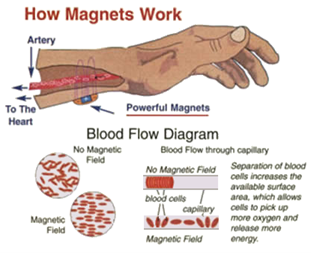A nurse is reviewing the medical record of a client who asks about the use of magnet therapy for pain relief. The nurse should identify that which of the following findings is a contraindication for receiving this type of therapy?
The client has an implanted defibrillator.
The client is allergic to penicillin.
The client has a history of alcohol use disorder.
The client has a prescription for metoprolol.
The Correct Answer is A
Choice A reason
The client has an implanted defibrillator is the correct answer. Magnet therapy involves the use of magnets to alleviate pain and promote healing. However, it is contraindicated for individuals with implanted electronic devices, such as pacemakers or defibrillators, as the magnetic field could potentially interfere with the functioning of these devices. The safety of using magnet therapy with implanted devices has not been established, and caution is advised.
Choice B reason:
Allergic to penicillin is incorrect. Allergies to penicillin or other substances are not related to the use of magnet therapy.
Choice C reason:
The history of alcohol use disorder is incorrect. A history of alcohol use disorder does not directly contraindicate the use of magnet therapy.
Choice D reason:
The prescription for metoprolol is incorrect. Metoprolol is a common medication used to treat various conditions, including hypertension and certain heart conditions. It is not a contraindication for magnet therapy.

Nursing Test Bank
Naxlex Comprehensive Predictor Exams
Related Questions
Correct Answer is B, C, E, D, A
Explanation
B. Provide adequate lighting to inspect the abdomen: Adequate lighting is important to ensure that the nurse can clearly see and assess the client's abdominal area. This step helps identify any visible abnormalities, such as skin changes, scars, masses, or distention.
C. Listen to the abdominal arteries using the bell of a stethoscope: Listening to the abdominal arteries helps the nurse assess blood flow and detect any abnormal vascular sounds, such as bruits or murmurs. This step provides information about vascular health and potential issues related to blood flow.
E. Locate liver and spleen borders by pressing hands 2.5 to 7.5 cm (1 to 3 in) into the abdomen: Palpating and locating the liver and spleen borders help assess the size and position of these organs. It can help identify hepatomegaly (enlarged liver) or splenomegaly (enlarged spleen), which could indicate various underlying conditions.
D.Check for areas of tenderness by pressing fingers 1.3 cm (0.5 in) into the abdomen: Palpating the abdomen for tenderness helps identify areas of discomfort or pain. It can provide information about potential inflammation, organ enlargement, or other sources of discomfort
Correct Answer is ["A","C","E"]
Explanation
Choice A reason:
Supplemental oxygen supplies are correct. Seizures can sometimes cause a decrease in oxygen levels, so having supplemental oxygen available can help support the client's respiratory needs.
Choice B reason:
Limb restraints are incorrect. Limb restraints are not typically used for seizure precautions as they can be dangerous and restrict the client's movement, potentially causing harm during a seizure.
Choice C reason:
Oral suction equipment is correct. Seizures can be associated with excessive saliva or potential vomiting, so having oral suction equipment ready can help clear the airway if necessary.
Choice D reason:
The oral airway is incorrect. Inserting an oral airway is not a standard part of seizure precautions and should only be used by healthcare professionals with proper training.
Choice E reason:
The blood glucose monitor is correct. Monitoring blood glucose levels can be important, especially if the client takes antiepileptic medications that may affect blood sugar levels.
Whether you are a student looking to ace your exams or a practicing nurse seeking to enhance your expertise , our nursing education contents will empower you with the confidence and competence to make a difference in the lives of patients and become a respected leader in the healthcare field.
Visit Naxlex, invest in your future and unlock endless possibilities with our unparalleled nursing education contents today
Report Wrong Answer on the Current Question
Do you disagree with the answer? If yes, what is your expected answer? Explain.
Kindly be descriptive with the issue you are facing.
